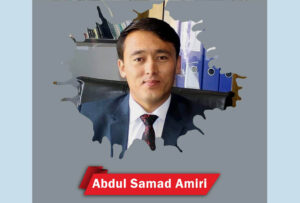Abdul Samad Amiri

Name: Abdul Samad Amiri
Occupation: Acting Director of the Afghanistan Independent Human Rights Commission in Ghor province
Date of Birth: May 25, 1990
Date of Death: September 5, 2019
Site of the Incident: Maidan Wardak Province
Person /Group Responsible for the Incident: The Taliban
Life and Education:
Abdul Samad Amiri was born in the Lal va Sarjangal district of Ghor province. Nawroz Raja, an Afghan author and researcher, noted in a Facebook post about Amiri’s life that he was the eldest son of the family and began his education at Imam Ali High School in Lal. Raja states, “Amiri graduated from high school in 2009 with excellent marks and in 2013 earned his law and political science degree from Kabul University with honors. During his school and university years, he also became proficient in English and Pashto.”
According to Etilaat Roz, as shared by Amiri’s younger brother, he had recently applied for the Fulbright Master’s program a while before his death. Nawroz Raja elaborates on this by stating, “He aimed to enhance his abilities to offer greater services to society and had applied for a Fulbright Master’s degree, with plans to pursue a Ph.D. later on.” He also quoted Amiri, who expressed, “I need some time to work in my field and improve my TOEFL scores from 97 to 110. But before that, I must organize my home life to ensure my parents and sisters, who have sacrificed so much for my growth, can live comfortably.”
On August 31, 2019, while traveling from Kabul to Ghor, Amiri was abducted by the Taliban in the Jalreez district of Maidan Wardak province. He was executed by gunfire on the morning of Thursday, September 5, 2019, and his body was found alongside the road. According to Etilaat Roz, Amiri’s execution by the Taliban occurred just two days after former U.S. envoy Zalmay Khalilzad announced that the U.S. had reached a tentative agreement with the Taliban. Amiri had married a year prior to his death and is survived by a daughter.
Activities:
Amiri was the acting director of the Afghanistan Independent Human Rights Commission (AIHRC) in Ghor province. Alongside this role, he engaged in various other activities. Nawroz Raja notes, “His roles during and after his studies included social and civil society activism, English teaching at Didban English Center, editor-in-chief of the biweekly Nahzat-e-Fekri, editor of the Shahrwand analytical and news website, member of the Afghan National Journalists’ Union, co-founder of the Center for Coordination of Journalists and Free Media, Kabul-based reporter for the Hazara Global Council, political rights monitor at AIHRC’s Bamyan office from December 2013 to July 2014, monitor for a research project at New York University in 2014, and collaborator at Rahnavard-e-Noor Private School.”
Etilaatroz, quoting Amiri’s younger brother during a program held to honor him, stated: “Samad Amiri was one of the coordinators for 400 underprivileged students in the “Roya” program. The Roya Foundation works to eradicate poverty in Afghan families and provides monthly financial support to underprivileged youth and children, enabling them to attend school and receive training in computer skills and English language.”
Nawroz Raja also highlighted Amiri’s efforts as the head of AIHRC’s children’s department in Ghor:
- Promoting children’s human rights through meetings, workshops, and educational programs
- Monitoring children’s access to their rights in schools, health centers, and public spaces to prevent violence and improve their condition
- Overseeing juvenile correction centers and other child protection facilities
- Supporting vulnerable children by referring them to relevant authorities and support organizations
- Educating parents about their children’s rights
- Preparing and submitting investigative and monitoring reports on the status of children’s human rights in Ghore Province and highlighting the related issues at the national level and in various media.
To read more please also see the PDF.